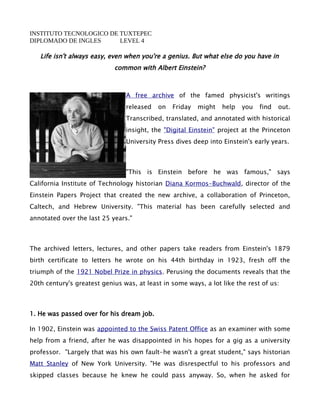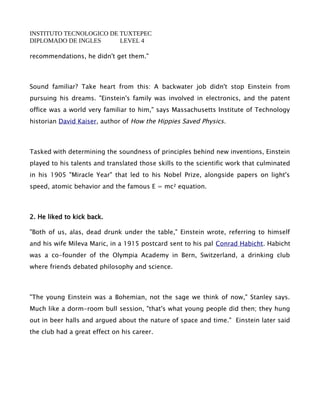Redaccion einstein
- 1. INSTITUTO TECNOLOGICO DE TUXTEPEC DIPLOMADO DE INGLES LEVEL 4 Life isn't always easy, even when you're a genius. But what else do you have in common with Albert Einstein? A free archive of the famed physicist's writings released on Friday might help you find out. Transcribed, translated, and annotated with historical insight, the "Digital Einstein" project at the Princeton University Press dives deep into Einstein's early years. "This is Einstein before he was famous," says California Institute of Technology historian Diana Kormos-Buchwald, director of the Einstein Papers Project that created the new archive, a collaboration of Princeton, Caltech, and Hebrew University. "This material has been carefully selected and annotated over the last 25 years." The archived letters, lectures, and other papers take readers from Einstein's 1879 birth certificate to letters he wrote on his 44th birthday in 1923, fresh off the triumph of the 1921 Nobel Prize in physics. Perusing the documents reveals that the 20th century's greatest genius was, at least in some ways, a lot like the rest of us: 1. He was passed over for his dream job. In 1902, Einstein was appointed to the Swiss Patent Office as an examiner with some help from a friend, after he was disappointed in his hopes for a gig as a university professor. "Largely that was his own fault-he wasn't a great student," says historian Matt Stanley of New York University. "He was disrespectful to his professors and skipped classes because he knew he could pass anyway. So, when he asked for
- 2. INSTITUTO TECNOLOGICO DE TUXTEPEC DIPLOMADO DE INGLES LEVEL 4 recommendations, he didn't get them." Sound familiar? Take heart from this: A backwater job didn't stop Einstein from pursuing his dreams. "Einstein's family was involved in electronics, and the patent office was a world very familiar to him," says Massachusetts Institute of Technology historian David Kaiser, author of How the Hippies Saved Physics. Tasked with determining the soundness of principles behind new inventions, Einstein played to his talents and translated those skills to the scientific work that culminated in his 1905 "Miracle Year" that led to his Nobel Prize, alongside papers on light's speed, atomic behavior and the famous E = mcÂē equation. 2. He liked to kick back. "Both of us, alas, dead drunk under the table," Einstein wrote, referring to himself and his wife Mileva Maric, in a 1915 postcard sent to his pal Conrad Habicht. Habicht was a co-founder of the Olympia Academy in Bern, Switzerland, a drinking club where friends debated philosophy and science. "The young Einstein was a Bohemian, not the sage we think of now," Stanley says. Much like a dorm-room bull session, "that's what young people did then; they hung out in beer halls and argued about the nature of space and time." Einstein later said the club had a great effect on his career.


